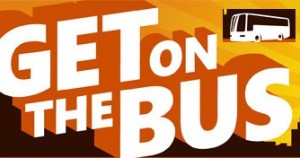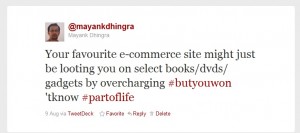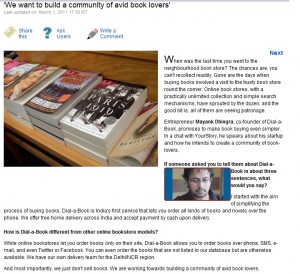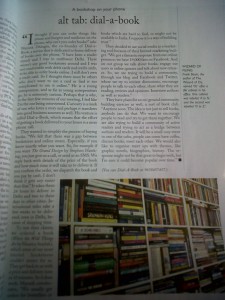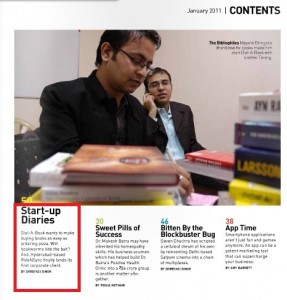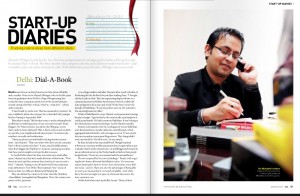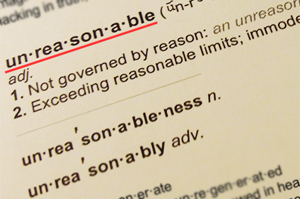Last month I was interviewed for a small video feature that covered 3 booming economies India, Brazil and China. Here’s the link to the video feature.
Category Archives: Dial-a-Book
Bookselling in the Time of VC $$
I’ve been wanting to write this post for quite a while now, glad this long weekend gave me enough time to finally sit on it.
A lot has changed since I started working on Dial-a-Book some 2 years or so back(then part time though). Back in Q4 – 2009 e-commerce was quite nascent and VC funding for it was not even half as common as it is today. There were just 2-3 online bookstore or e-commerce sites that looked like they could go anywhere and every week a new online bookstore was being launched. Indiaplaza was probably the most popular one.
All these existing and upcoming online bookstores were pretty much doing the same things, building a half decent website, listing a lakh odd books and giving heavy discounts in hopes of wooing the online audience. Two years into it, a couple of the popular sites at that time have grown enormously, another couple new sites have emerged and attained very good scale and almost all the remaining ones have either shut down or are doing just well enough to sustain the owners.
I’ve always been a price conscious book buyer with likings but hardly any loyalty to a bookstore. I remember when i first discovered Midlands who offered me 20% discount on all books how I moved almost all(leaving a few impulse buys here and there) my book purchases to them. Kinda same thing happened when I discovered the desi online stores, the fact that they offered even more discounts and could home deliver(for free) almost any book in a few days time was a good enough reason for me to move all my book shopping( a few books/month on average) to them.
Back then I was one of the only few people in my circle to buy books online and almost none of my friends/colleagues had much clue about the online book buying scene. The booksellers on the whole turned out to be surprisingly unaware of the developments in the e-commerce(mostly book selling) space. They hardly had any idea about online bookstores and those who did were quite dismissive of them by saying ‘Such things work in the US not in India, here people want to touch and feel before buying’, ‘These online sites give too much discounts, they can’t last long’.
Circa 2011, the same bookseller is now offering a recently released book by Amish Tripathi at 1/3rd discount, which is just 3 Rs more than the price (Rs 192) at which it is being sold at most online bookstores.
So what changed? More importantly, what led this change?
Q 1. What Changed?
A 1. The Market Dynamics
1) More for Less

Giving a 33.33 % discount on a newly released book would have been unthinkable for any bookstore, especially the ones which sells 200+ copies of each new release every month with a standard discount. But now the whole game has changed, today’s reader is exposed(and addicted) to heavy discounts, highly efficient and user friendly customer experience and the only way to survive is to offer competitive pricing coupled with widest possible range and great overall experience. Gone are the days when the booksellers used to decide which books to import/stock, how to price them and to procure locally available books on customer request (if at all) and take a week for it.
Every search on twitter(for a big online store) would reveal at least a couple tweets mentioning how people now browse books at landmark/crossword and buy them online. You can see the shift happening right there.
2) Let’s Get Online
Seeing the stellar growth of some of the famous online stores a few bookstore chains also woke up from slumber and started developing and promoting their online stores. Landmark, Crossword, Odyssey et all now have online stores where they claim to offer hugh discounts (interestingly on some books the discounts are even even more than anywhere else)
Not just this, even the smaller chains(like Sapna, oxford) and individual bookstores are online and spending money on google ads and social media to promote themselves.
Apart from these there are some publishers (like Pearson) and some distributors(like Prakash) who couldn’t resist the temptation of taking a shot and online bookselling and thus too have jumped the bandwagon and are doing their best to well, give more discounts.
Going further all the e-commerce stores which were focusing on other categories (mobiles etc) also have started adding books to their product list. In news recently was Homeshop18’s acquisition of Coinjoos
That’s not it, the grapewine has it that still more companies from different sectors dazzled by the million and billion dollar valuations of popular Indian e-commerce stores are planning to take the plunge and well start another online bookstore
3) Better Support
Thanks to the success of round 2 of e-commerce especially for books a lot has improved on the backend i.e at the end of publishers and distributors. Lots of processes have been initiated and followed regularly at the vendors end. Most distributors now stock their data and share stock reports bi weekly/weekly, publishers regularly share information about new and upcoming releases. Most of these guys are no better than sloppy govt officials who take enormous time and effort to do things but in order to survive some of them have learned to be better organized and efficient.
Q 2. What Led To The Change?
A 2. Lofty Ambitions Backed By VC $’s
A quick look at the new release section of most online book stores will put many a booksellers into depression. A new release on an average is on a 30% discount and depending on the hype surrounding it, publisher and competition it could go up to 50 % (Yes, that’s the cost which even the publishers might not give to their distributors but if you are luck that’s what a new release could cost you with free home delivery).
The logic championed first by Amazon (and thus replicated ad infinitum) is, give heavy discounts on new books to get more eyeballs/buzz and bigger volumes thus better topline and better pricing from suppliers. Repeat.
You don’t expect a regular customer to understand(or bother with) all this but seeing massive discounts on the online portals make them feel that there’s a huge margin in books and as if all this while their neighborhood/favourite bookstore chain was ripping them of by not giving as much discounts.
For a customer who has bought a book at 30-40% discount will hardly ever buy a book at 10% or no discount at all
Though as a customer this would have been a dream come true for me but being on the other side of the business I too am surprised at how its working for some sites. You can now order a 95 Rs chetan bhagat book for Rs 57-60, make it two books and its free home delivery and the book is home delivered in 1-2 working days via class A courier (Bluedart if you are lucky). It doesn’t leave much to imagination that no one, even the publisher can possibly make any money in these transactions.
A lot of small booksellers ask me “How can online sites give this much discounts when the big distributors themselves don’t get as much discount from the publishers?”
The answer more often that not lies in the fact that most sites are not focusing on making money on these transactions here but on just getting more customers. With millions of $’s in VC funding the formula is simple
- Position yourself as the cheapest place to buy stuff online.
- Buy a lot of online ad inventory from Google/Yahoo et all
- Point these ads to a web page on your site which list books at ridiculously low prices
However in all this merry making of deep discounted prices there’s a catch.
For every 5 or 10 super cheap transactions there’s 1 transaction on most popular online bookstore in which the customer ends up paying price more than the its price on a bookstore of at times even worse paying more than the MRP/MRP for Indian Market.
‘The Goddess In India: The Five Faces Of The Eternal Feminine’ by Devdutt Pattnaik (ISBN: 9780892818075) is one such title. I personally bought a few copies with Rs 395/- sticker on them and on checking online the same book (picked from the same source because I can compare the delivery time on the site) being sold for almost 4 times the price.
A possible trick here could be: Stock a few copies as per the local market MRP of book which is scarcely available, once the copies at suppliers run out, sell them at international market MRP and deliver them in 2-5 days (because its in your stock).
Such cases are more common in categories other than general books/novels, especially where chances of price comparison are less. This is clearly a minority case
This is kinda similar to what a popular bookstore in Delhi does with their super discounted sales. Buy books as per local market MRP(which is easily half or less than the international market MRP) and then sell it on the MRP pretending it to be on heavy discounts . Ex: A book with local MRP of Rs 350 is being tauted as being for Rs 1200 and after 70 % discount it comes to be for Rs 350/-. So the customer ends up paying the local market MRP (no discount at all) but might think he saved 70 % and got a great deal
Going online one can leverage efficiencies like just in time inventory, virtually unlimited list of products, pre-orders etc which in itself offers a significant advantage over traditional bookstores but selling books with -ve margins, plastering the internet(or TV) with your ads is something that cannot be competed against.
I’ve heard of some booksellers and publishers taking up this issue of excessive discounting with online bookstores and they apparently have made some progress like this popular publisher of general books has told one big online store to not offer more than 35% discount on their new releases. For every big publisher that is able to get their concern heard and acted upon there are five smaller publishers that are given a choice to shut up completely or face de-listing from the site all together.
Having said all this I feel the time has arrived for every bookseller to re-think their way of doing business and figure out how are they going to sustain themselves in these times where their much bigger and deep pocketed competitors are willing to do anything that it takes to own more customers.
And if you are beginning to start an online bookstore(e-commerce store if you will), you better have a really well thought out execution and funding plan.
Techie Starts Dial-a-Book
Despite being wanting to blog for a long time all I am able to find time for is to share the links/stories of Dial-a-Book. But I sincerely hope to change this, in the mean while here’s another story on a site for techies
Here’s an excerpt
Mayank Dhingra studied to be an electronics engineer and started his career as a software developer. In 2009, he quit the security of a full time job to start Dial-a-Book that lets you order all types of Books over the phone. They accept Cash on Delivery in 27 cities including NCR, Mumbai, Pune, Bangalore, Chennai, Kolkatta, Jaipur, Ahmedabad and Hyd. TG caught up with Mayank
Techgoss (TG): Tell us about your educational and IT Work Background?
Mayank Dhingra (MD): I am an electronics engineer by education and started working as a software developer and eventually turned into a Social Media Consultant. My first job was with Fidelity in which I worked on building and enhancing software (on Microsoft technologies) for their internal use. In my second job at Slideshare I worked on their Slidecast feature, did some work on the back end/server side and some front-end coding for a few features.TG: How was Dial-a Book business idea born?
MD: I’ve always wanted to start a business around books and after …..
You can read the complete article here
First City’s story on Dial-a-Book
Last few weeks/months have been good for Dial-a-Book especially as far as the press mentions are concerned. While January saw coverage from Inc India (Dial-a-Book to be chronicled by Inc India), February saw the coverage in Yourstory.in (My Interview with YourStory.in) and Rediff
and this month its First City Magazine that carried a story on us
It’s a great story but apparently they don’t have it online so you’ll have to grab a copy of March issue of First City to read 🙂
My Interview with YourStory.in
It’s been a long time since I scribbled something here but hopefully things will be better in the coming few days.
Anyways, here’s an excerpt from my email interview with YourStory.in, hope you like it
When was the last time you went to the neighbourhood book store? The chances are, you can’t recollect readily. Gone are the days when buying books involved a visit to the trusty book store round the corner. Online book stores, with a practically unlimited collection and simple search mechanisms, have sprouted by the dozen and the good bit is, all of them are seeing patronage. We at YourStory recently caught up with entrepreneur Mayank Dhingra, the co-founder of Dial-a-Book, who promises to make book buying even simpler. In this exclusive chat with YourStory, he speaks about his startup and how he intends to create a community of book-lovers.
If someone asked you to tell them about Dial-a-Book in about three sentences, what would you say?
Started with the aim of simplifying the process of buying books, Dial-a-Book is India’s first service that lets you order all kinds of books and novels over the phone. We offer free home delivery across India and accept payment by cash upon delivery.
How is Dial-a-Book different from other online bookstore models?
While online bookstores let you order books only on their site, Dial-a-Book allows you to order books over phone, SMS, email, and even Twitter or Facebook. You can even order the books that are not listed in our database but are otherwise available. We accept cash upon delivery and have our own delivery team for the Delhi/NCR region. And most importantly, we just don’t sell books. We are working towards building a community of avid book lovers.
How did the business idea for Dial-a-Book come about?
I have been an avid reader since my college days. I had always thought of doing something with books at some point of time. The advent of the online bookstore concept in India intrigued me and I spent some time observing various online bookstores, their way of working and other variables. I also used to observe how people shop for other things like medicines, groceries, food etc. It was during this time that I realized that the process of buying books can be further simplified and made more user-friendly, just like ordering burgers or pizzas. And hence, Dial-a-Book was born
Tell us about your background.
I did my Electronics & Communications engineering from Delhi College of Engineering (2005 batch). Towards the end of my college stint, I started toying with the idea of staring my own business. I joined Fidelity Investments as a campus recruit and worked there for one and a half years, building software for internal use.
From Fidelity, I joined Slideshare where I worked on various features of the website and some back-end technologies. In Slideshare, two friends of mine and I started an online platform called Kwippy. Kwippy started as a status message aggregator and got a lot of traction in both Indian and international online media.
After working at Slideshare for a year, I left the organization and joined MPower Mobile. I worked there for a year and quit to start something of my own. That’s when Dial-a-Book happened.
Let us know about the tie-ups that you have. Is there acceptance for your concept?
We’ve tied up with most local distributors based out of Delhi along with a few small to medium-sized publishers and we regularly procure books from them. We did a trial run before starting the service and based on the feedback, we decided to venture into the business. We’ve sold books in almost all of the 27 cities where we have Cash on Delivery (COD) and a few other places as well. A lot of our customers regularly buy their books from us and many of them recommend us to their friends and family.
Where do you see online book buying and Dial-a-Book five years from now?
Five years from now, a significant percentage of books sold in India will be sold online and over the phone. In five years, we see ourselves as the number one player in the ‘over the phone’ category and amongst the top 5 in the online space. Currently, there are a number of guys vying for a piece of the pie(online). But my view is that the next few years will see a lot of consolidation in this space and the market will have just a handful of players who will do a majority of the business.
In the next five years, Dial-a-Book will tie-up with more publishers, expand to other cities, explore other/faster modes of delivery, work more closely with authors and build a passionate community of book lovers. We have a lot of interesting ideas for the business which we’ll put to test soon.
This is an excerpt, you can read the complete story here: http://bit.ly/i1wdfV
Dial-a-Book to be chronicled by Inc India
I am happy to share with the readers of this blog that my start-up “Dial-a-Book” was recently profiled by Indian Edition of the Awesome Inc magazine of the US. To make things more cool they’ve added us to their feature ‘Start-up Diaries’ in which they track various start-ups over a period of time to see how they are performing. Guess, now we have another reason to perform better 🙂
I love Inc.com and try to follow it as much as I can and it’s great to get recognition from them. The story shares my and Tarang(my younger brother and partner in Dial-a-Book)’s educational and professional background and how we started Dial-a-Book. It also looks into our business model, our operations, values and future plans.
I suggest you grab a copy of Jan edition of Inc India and give it a read.
PS: You can also call us at 9650-457-457 if you want to get a copy of Inc India home delivered(free home delivery)
PPS: The previous big mention Dial-a-Book had in press was when Mint included us in their story of start-up ideas you wishyou had thought of.
Let your customers be *Unreasonable*
Almost every business irrespective of the stage it is in finds itself in a situation where the customer demands/expectations in terms of service,urgency or flexibility are way beyond what you offer. Young businesses find it particularly tough to cope up with customers like these who demand the best of everything and in many cases least willing to pay anything(extra) for these services. Because of the inherent lack of resources(in a young business especially the self-funded/bootstrapped ones) and other reasons the question that occurs is of which customers or their demands to relent to and which ones to let go. All this is despite the fact that nobody wants to lose a customer or an even an order from them.
When such decisive moments occur regularly the business has two(obvious) choices
- Drawing a fine line of what can and what cannot be done(A policy)
- Stretching themselves to accommodate the extra needs/demands of the customers (A policy of not having a policy)
I have an intuition(and some experience too) that most businesses though try for option 2 but settle for option 1 sooner than later. Pragmatically speaking it makes perfect business sense but I feel for some businesses it makes sense to bend a little more and choose option 2. The option to accommodate all the whims and fancies of a customer to the extent of them being unreasonable. Yes, in short “let your customers be unreasonable”. While this might sound unreasonable itself I feel its worth giving a try. The rationale(A bit optimistic and Utopian) behind the same being
- If you offer the kind of services which are really tough to deliver, your value in eyes of the customer is quite likely to get a raise. Do this again and they will set you up a notch up than others in your market and will most likely return to you again and again.
- By wowing the customer you stand great chances of them spreading the word about you. This works particularly well since no competitor of yours would have offered that service to them and you did.
- You test your limits and that of your system
- By accommodating all sorts of customer needs regularly you get some unexpected insights on how to do certain things or how to do them better or even better that of a new/better business Idea.
What do you think?
PS: I was inspired to write this post after our team at Dial-a-Book completed a book delivery around 9:45 PM to a place quite far from our office and home. The customer wanted the book after 9 PM in the night or before 6:30 AM in the morning and we were happy to push our limits 🙂
Dial-a-Book gets covered in Todays Mint Lounge
My new startup ‘Dial-a-Book’ has got its first mention in print media today. It’s been almost a year since I started working on Dial-a-Book along with my younger brother and it’s been an absolute fun ride.
Here’s an excerpt from the article
Past life
Dial-a-Book is a Delhi-based start-up founded by brothers Mayank and Tarang Dhingra. Tarang, 25, is a final-year student at the University of Delhi. Mayank, 27, is a software engineer who left a corporate job at Fidelity International in 2005 to work for a string of tech start-ups—from SlideShare, an online presentation hosting service, to MPower Mobile, which works with mobile payments. In 2008, before the Twitter bandwagon bulldozed its way across the country’s Internet landscape, he experimented with creating a Twitter-like service for India called Kwippy—which Mayank called a “conversational platform”. The site folded in mid-2009, and subsequent dabbling in ideas on what to do next led to Dial-a-Book
and you can read the complete article here
I know some of you *might* find this surprising and *might* have some questions for me, so feel free to ping me anytime 🙂

